Ancient Chinese Secret
This is the third in a series of lessons on apologetics. The word apologetics, by the way, doesn't mean we're sorry for anything we have done. It simply is a word that originally meant an explanation, the aspect of explaining things as they are. So we are looking at lessons that explain things the way we see things from the Bible point of view.
This particular lesson deals with characters in the Chinese language. I call it Ancient Chinese Secret, but actually these things are no secret at all. For anyone who wants to do the research, it's right there to be seen, to be learned, to be discovered. We will be looking at 21 different characters that perfectly parallel the story of the Bible in the first several chapters.
8So the Lord scattered them abroad from there over the face of the whole earth; and they stopped building the city. 9Therefore its name was called Babel, because there the Lord confused the language of the whole earth; and from there the Lord scattered them abroad over the face of the whole earth.
- Genesis 11:8-9
This is following the flood when all the people of the earth had gathered in one spot and they were building a tower up to heaven. God said, Well, the population has grown to the point where they're doing things they shouldn't be doing and they aren't going to be good. And so He scattered them, He confused their languages and that's why that place was called Babel. They couldn't understand what each other was saying, and so they would separate off into groups based on those they could understand.
In this lesson we are studying the people who evidently migrated from Babel to the land we now call China and became the people we now call the Chinese people. Let's take a look at their historical timeline. t
Basic Chinese Historical Timeline
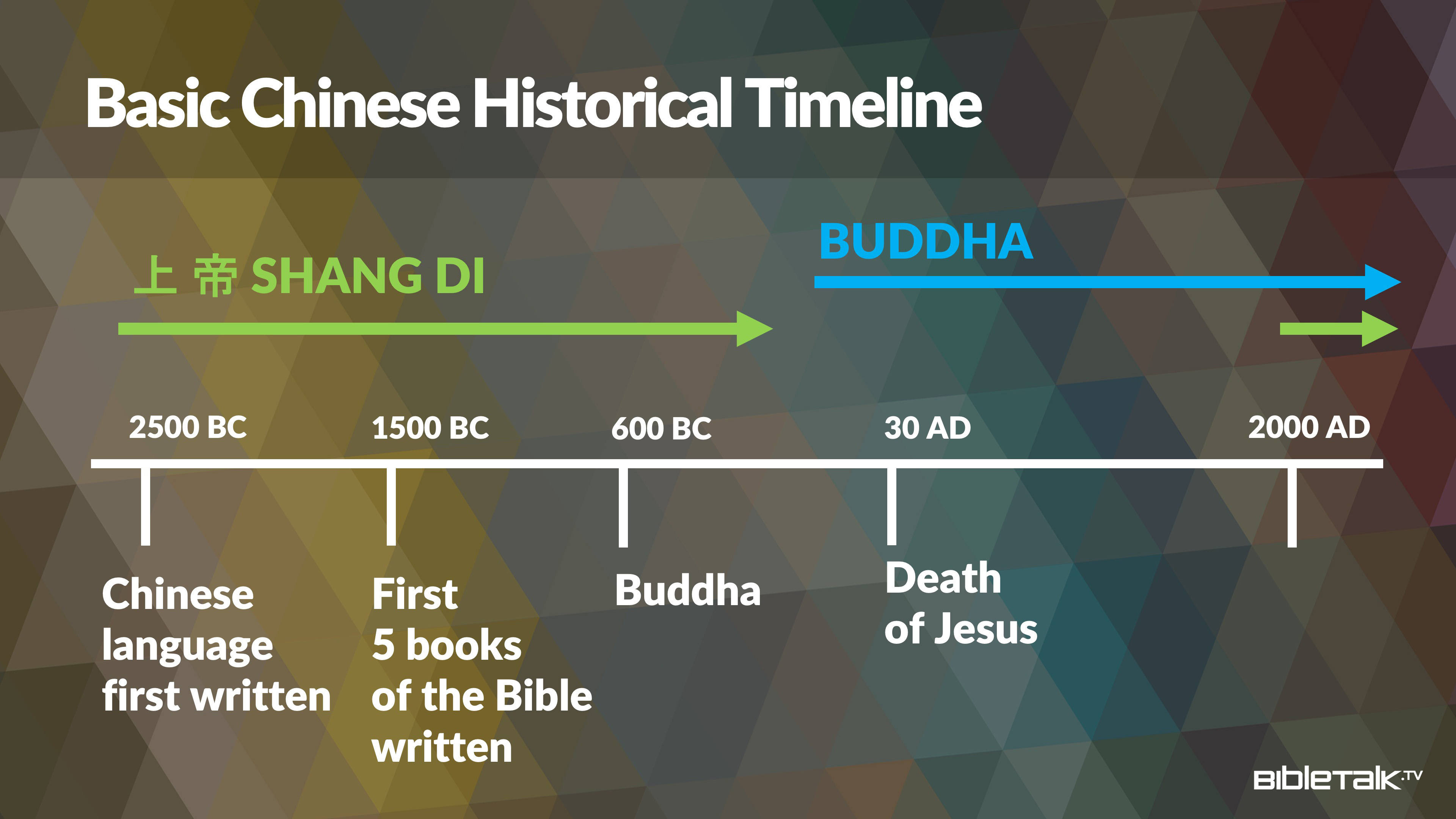
Most of us, when we think about China, we think about Buddha and Buddhism as today, the Chinese are primarily Buddhist. But Buddha did not come into the Chinese culture until about 600 B.C. As you can see from that graph above, about 1900 years prior to that, however, their language was written down 2500 B.C. coinciding very well with what would have been the date of the Tower of Babel in the scattering of the people. At that time the Chinese people were monotheistic. They worshiped one God and that one God was known as Shang Di.
Now when Abram was ninety-nine years old, the Lord appeared to Abram and said to him,
"I am God Almighty;
Walk before Me, and be blameless.
- Genesis 17;1
We are talking about the Chinese culture, but here we are looking back at Hebrew culture and the progenitor of the Hebrew race, Abraham. The Lord (Hebrew word Yahweh) appeared to Abraham and we also have in the same text in English God Almighty, which in Hebrew is El Shaddai. So we have El Shaddai for the Hebrews but we have Shang Di for the Chinese. Are these the same? You can see how the names sound and look very similar as they're written out. It is quite a coincidence if this is not the same person. Of course, names change a little bit from one language to the other. We understand how the name Jesus was not originally pronounced like we pronounce it in English in Greek. It would have been E-A-SUS, in Hebrew it would have been Joshua. We're monotheistic and the Chinese initially were monotheistic. They both worshiped one God and their God had a very similar name and may well have been, and I believe it was, the same God.
"Hear, O Israel! The Lord is our God, the Lord is one!
- Deuteronomy 6:4
One God is what the Hebrews believed in. One God is what the Chinese originally believed in.
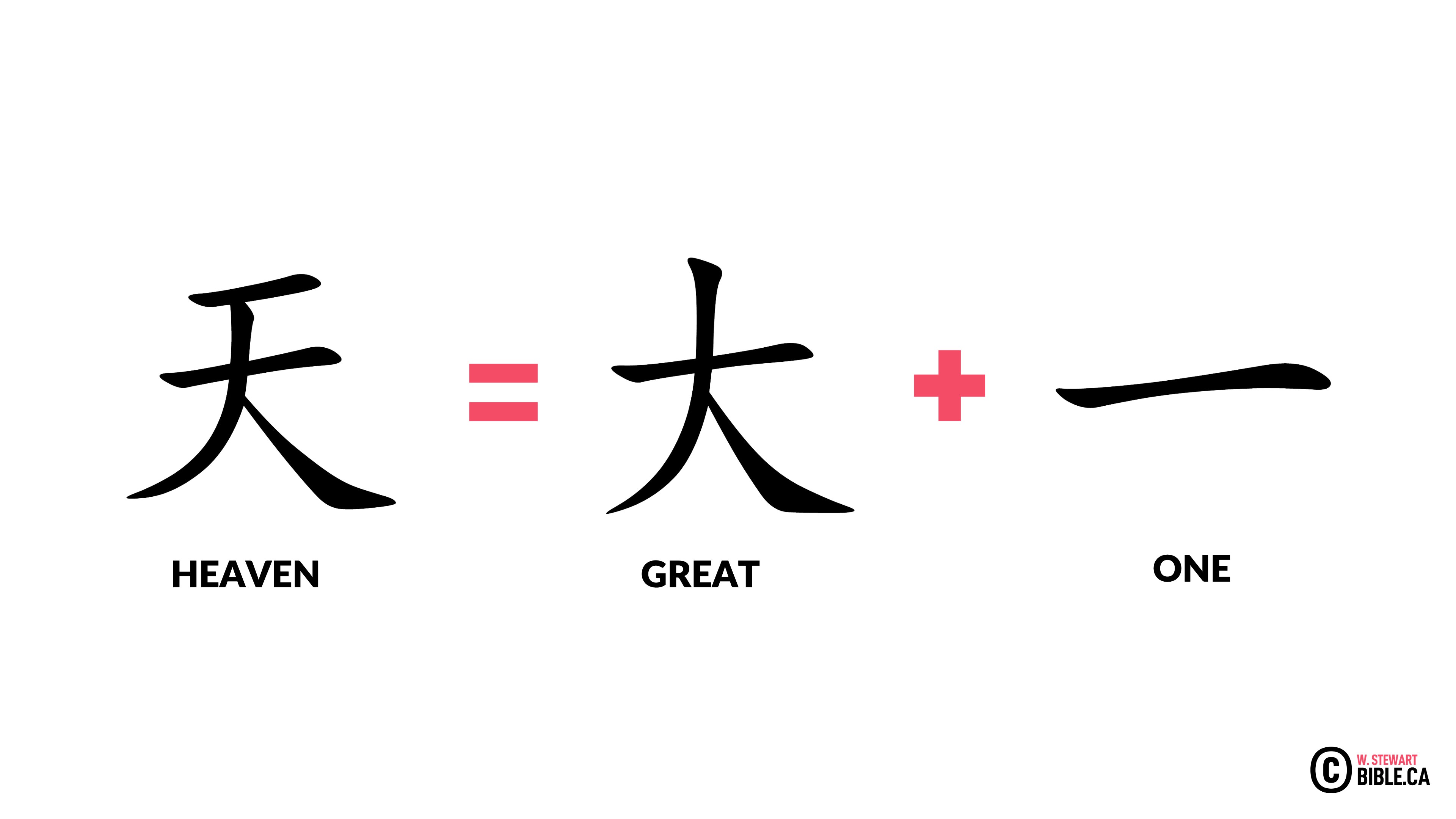
Chinese Character for Heaven
This character is made up of two other characters, one for great, and the other is a slash mark representing one. So we have the Great One and He is in heaven. That's how the Chinese would express the idea of heaven as it is the place of the Great One, the one God in whom they believed and called Shang Di.
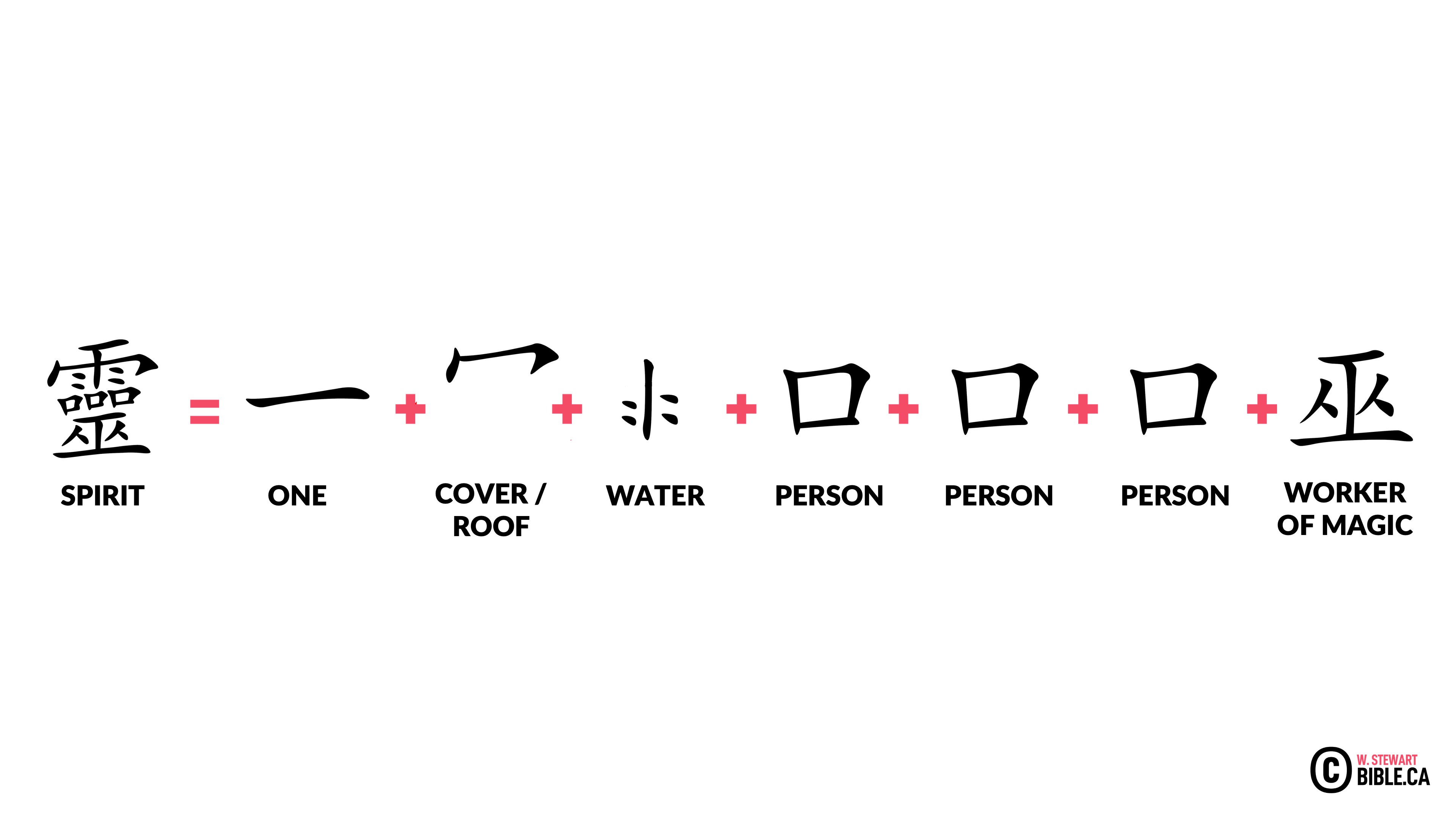
Chinese Character for Spirit
1In the beginning God created the heavens and the earth. 2The earth was formless and void, and darkness was over the surface of the deep, and the Spirit of God was moving over the surface of the waters.
- Genesis 1:1-2
The Chinese character for spirit is also made up of many other smaller characters. We got the character for one, and then the character representing cover or roof, and then we have water represented with the next character. And then three of the same represented images that mean person, person, person, three people. Isn't that interesting? And all of that when you add worker of magic, comes out to mean the spirit.
We understand that the spirit of God did not work magic, but he was supernatural. A universe was created in which there are natural laws. But God of course works above nature in everything. That is above nature and could be referred to as magic, though technically it's not magic. It's a different kind of force, different kind of power outside of nature. But isn't it fascinating to me that this character for Spirit is made up first of the character, one under one roof, united with water involved and there are three people in total, which is the idea of the Triune God, Father, Son and Holy Spirit that we see represented in the Hebrew Bible.
The Chinese have the same concept in their character for Spirit. And you might recall that Jesus said God is a Spirit, and those who worship Him must do so in spirit and truth. So this is the same message, whether we're looking at it from the Hebrew or from the Chinese.

Chinese Character for Create
Then the Lord God formed man of dust from the ground, and breathed into his nostrils the breath of life; and man became a living being.
- Genesis 2:7
So this is a symbol for create. We have the character representing speak and then dust or mud, the character for life, a small hash mark and then the character representing walk. And these characters put together mean to create, which makes perfect sense from the standpoint of Genesis 2:7, God creates man. He speaks into the dust life and that man became a living being, a living soul, the Chinese character perfectly paralleling the Hebrew. They both match so well.

Chinese Character for First / Happiness
The Lord God planted a garden toward the east, in Eden; and there He placed the man whom He had formed.
- Genesis 2:8
We have the character representing first being a combination of the small hash mark (living), dust and man. The living dust that is man makes the character first. In Genesis, the first man is put in a garden. So we see the next idea of happiness in the Chinese characters which is another busy character. But we have in that character God represented by the interesting looking artwork there, I would call it in the sign for life and then man and then the garden. What could better represent happiness than man in the garden, in fellowship with God? That's how the Hebrew writers put it down, and that's how we see it in the Chinese language.
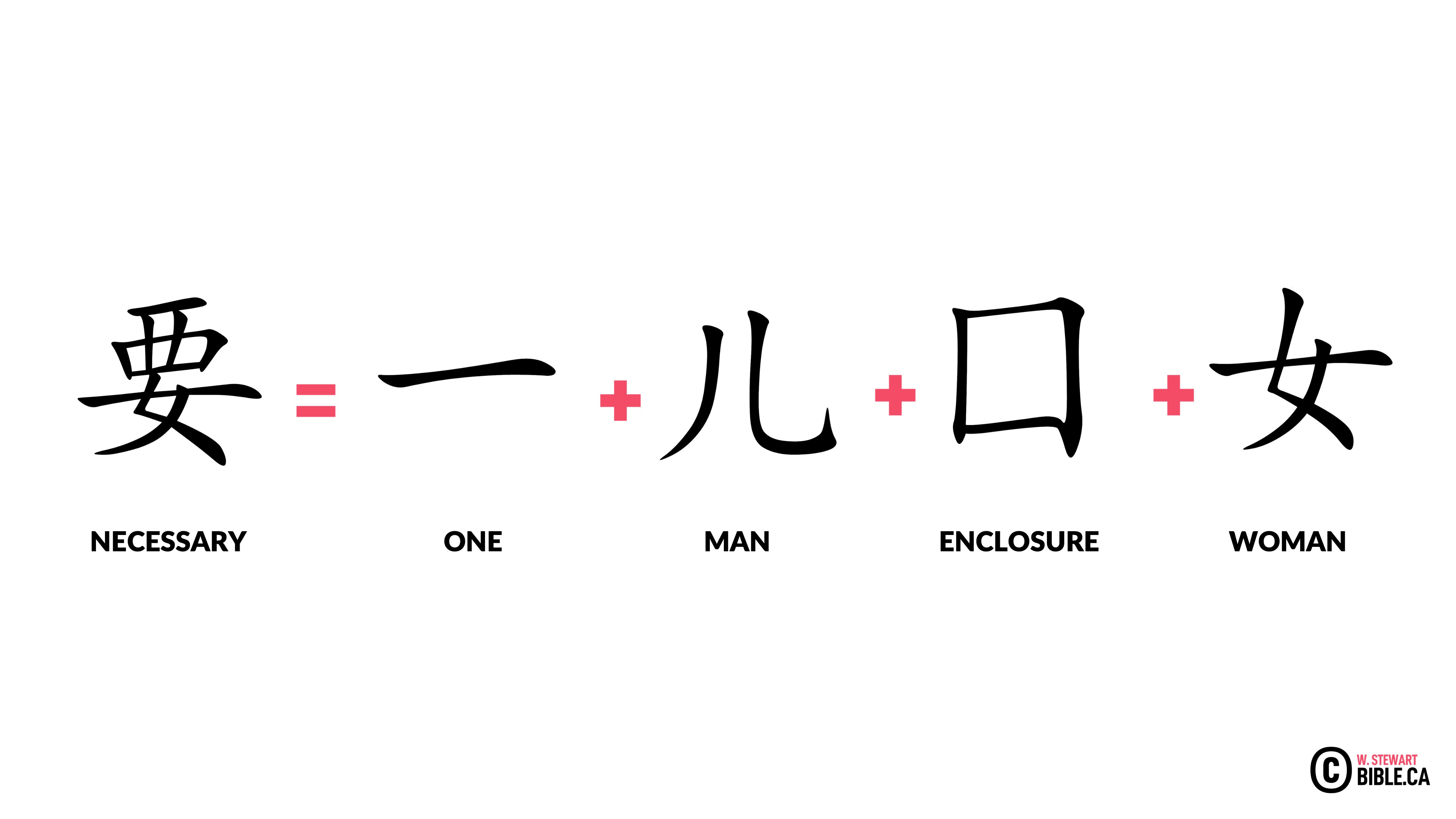
Chinese Character for Necessary
Then the Lord God said, "It is not good for the man to be alone; I will make him a helper suitable for him."
- Genesis 2:18
The character for necessary is created by combining the hash mark representing one, the character for man, an enclosure, and then a new character we've not seen before representing woman. So one man in a garden with a woman. The woman was necessary. God looked at man being alone and he said, It's not good for the man to be alone. Something else was necessary and he created the woman and that completed the family. It made the first marriage. And all of that is wrapped up in this concept of necessary. God bringing the woman to the man in the enclosure, in the garden.
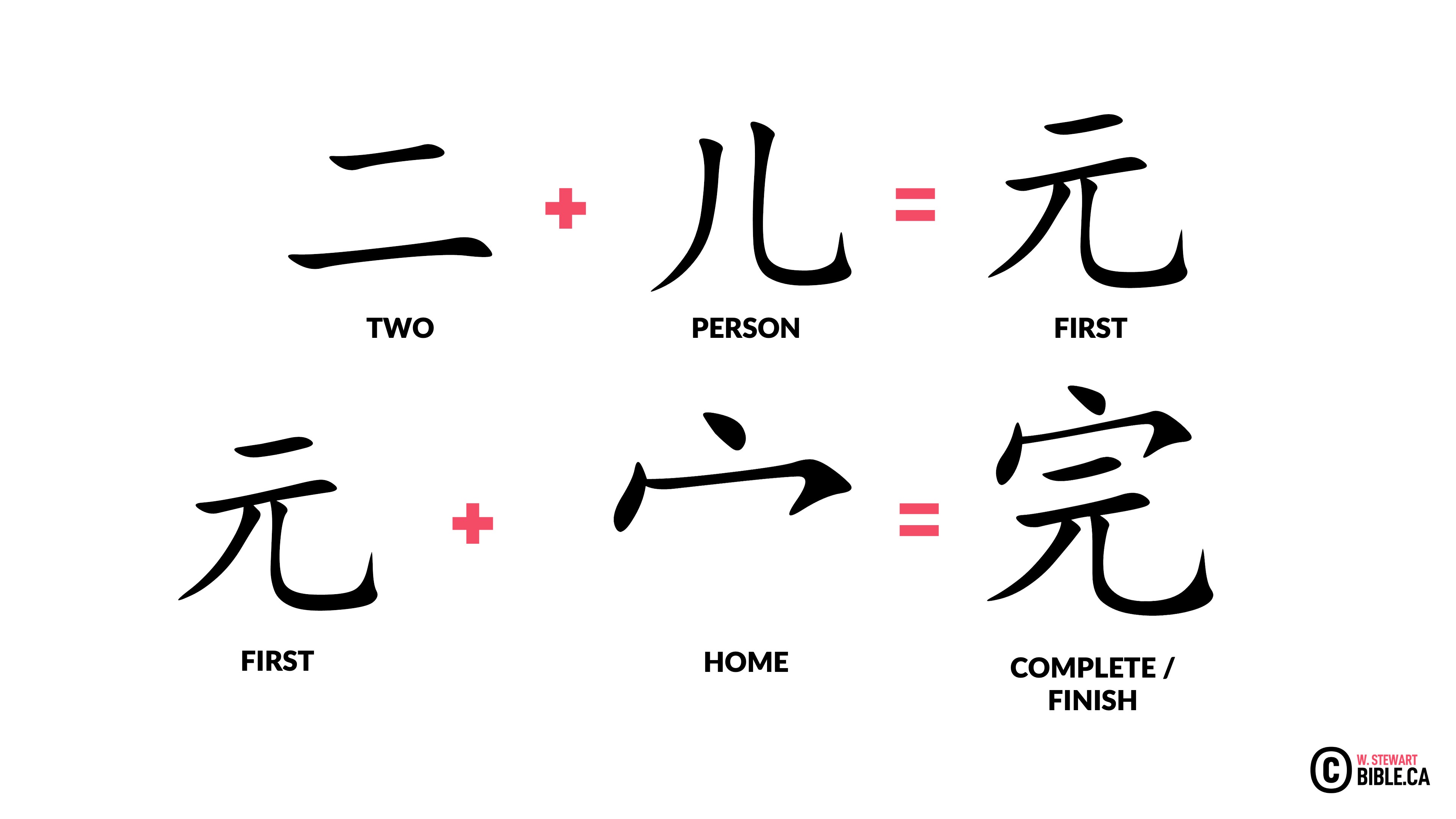
Chinese Character for First / Complete
21So the Lord God caused a deep sleep to fall upon the man, and he slept; then He took one of his ribs and closed up the flesh at that place. 22The Lord God fashioned into a woman the rib which He had taken from the man, and brought her to the man.
- Genesis 2:21-22
So the woman has been brought to the man and she is the final crowning part of his creation. Everything is done. He's not going to create anything else or anyone else. He makes the first man and he makes the first woman from the man and brings her to the man. And now God's creation is finished. And so we see in this Chinese character the idea of two people being first and then first is represented by home, and that stands for complete or the character for complete is represented through the idea of first and home. And all of this perfectly combines with the Genesis account to give us two parallel ideas. In other words, the Chinese characters tell us the story that was first written down by Moses in the Hebrew Bible.
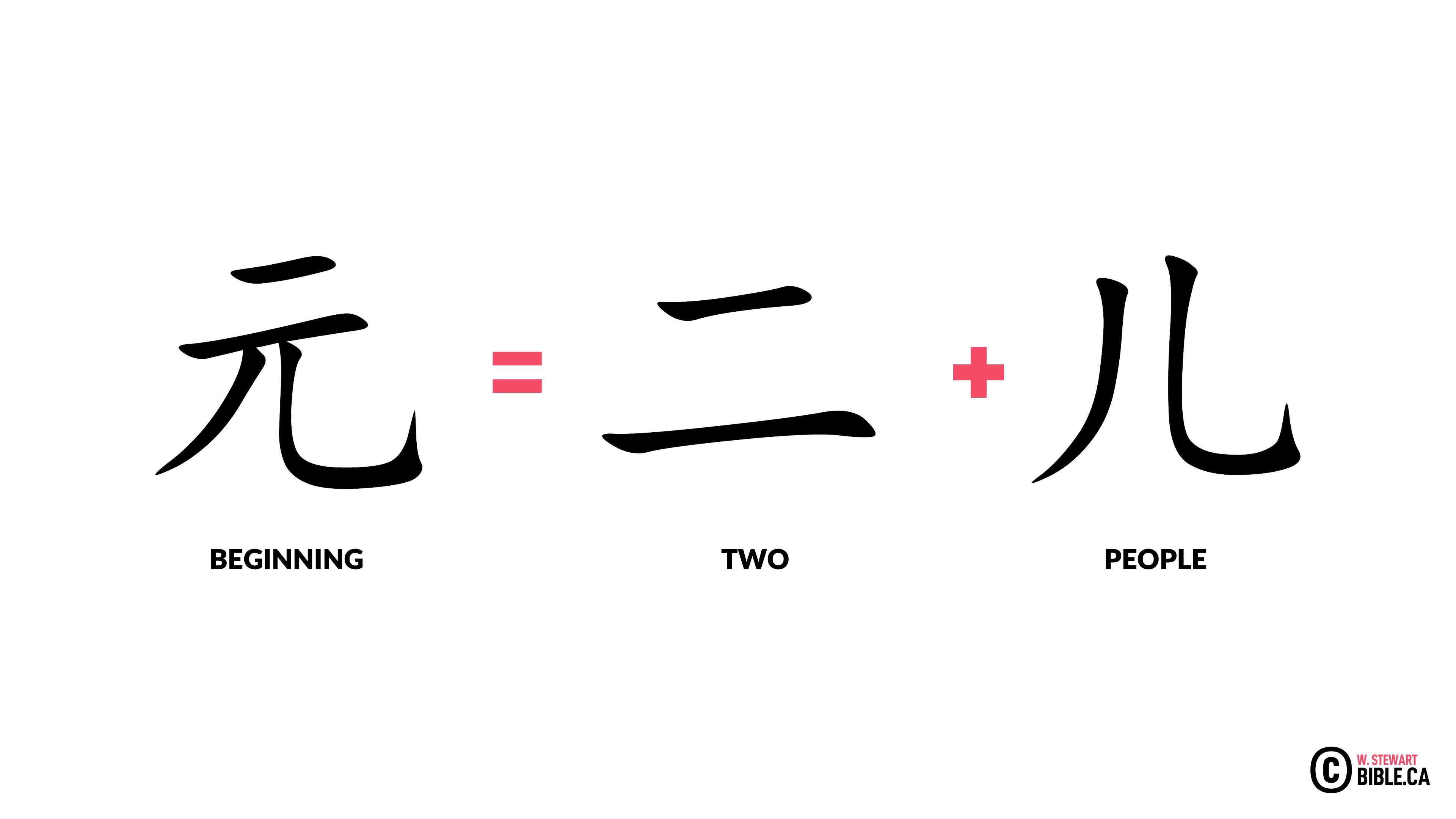
Chinese Character for Beginning
And He answered and said, "Have you not read that He who created them from the beginning made them male and female,
- Matthew 19:4
Of course, Genesis tells all about the beginning but in Matthew 19 Jesus the Son of God makes reference to the beginning with regard to marriage. And so we see here the Chinese character for beginning, which is a combination of two hash marks representing two people. Two people were the beginning. One man couldn't be the beginning. He couldn't be fruitful. He couldn't multiply. He couldn't have children. But a man with a woman, now you have a beginning and that's how the earth was populated. We all go back to our beginning with Adam and Eve.
So we have this text from Matthew 19 where Jesus addresses this idea of the beginning. When Jesus was asked about marriage, he goes back to the beginning and the Chinese spoke of the beginning as two people, isn't that interesting?

Chinese Character for Forbidden / To Warn
Here we have the Chinese character representing the idea of forbidding or warning, and that character is made up of two characters. One character is two trees, and that's combined with God to give the idea of warning.
16The Lord God commanded the man, saying, "From any tree of the garden you may eat freely; 17but from the tree of the knowledge of good and evil you shall not eat, for in the day that you eat from it you will surely die."
- Genesis 2:16-17
God is giving Adam a warning. There are two trees, one you can eat from and one you cannot. And so this Chinese symbol represents that truth very well.
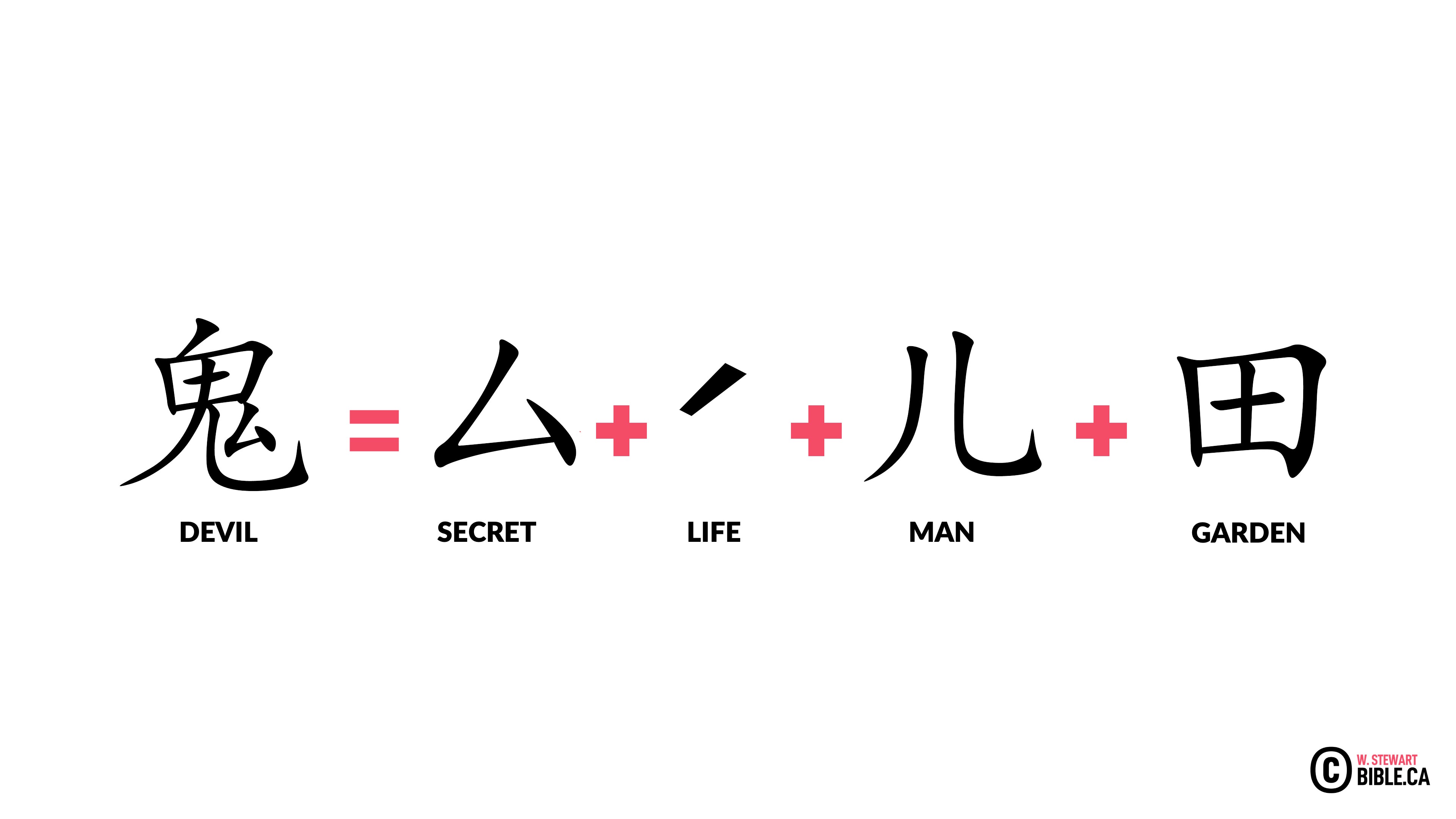
Chinese Character for Devil
1Now the serpent was more crafty than any beast of the field which the Lord God had made. And he said to the woman, "Indeed, has God said, 'You shall not eat from any tree of the garden'?" 2The woman said to the serpent, "From the fruit of the trees of the garden we may eat; 3but from the fruit of the tree which is in the middle of the garden, God has said, 'You shall not eat from it or touch it, or you will die.'" 4The serpent said to the woman, "You surely will not die! 5For God knows that in the day you eat from it your eyes will be opened, and you will be like God, knowing good and evil."
- Genesis 3:1-5
So this is the character representing the devil spoken of as the serpent here. But we know from further reading and in the Bible that that serpent was the devil. This character is made up of the Chinese character for secret, life, man and the garden. And so the devil comes secretly to the man or actually to the woman first in the garden and leads Eve astray. And her life is put in danger by what the devil encourages her to do, and what she does in fact do, and man joins her in that. So we have once again a parallel idea in this character for the Devil.
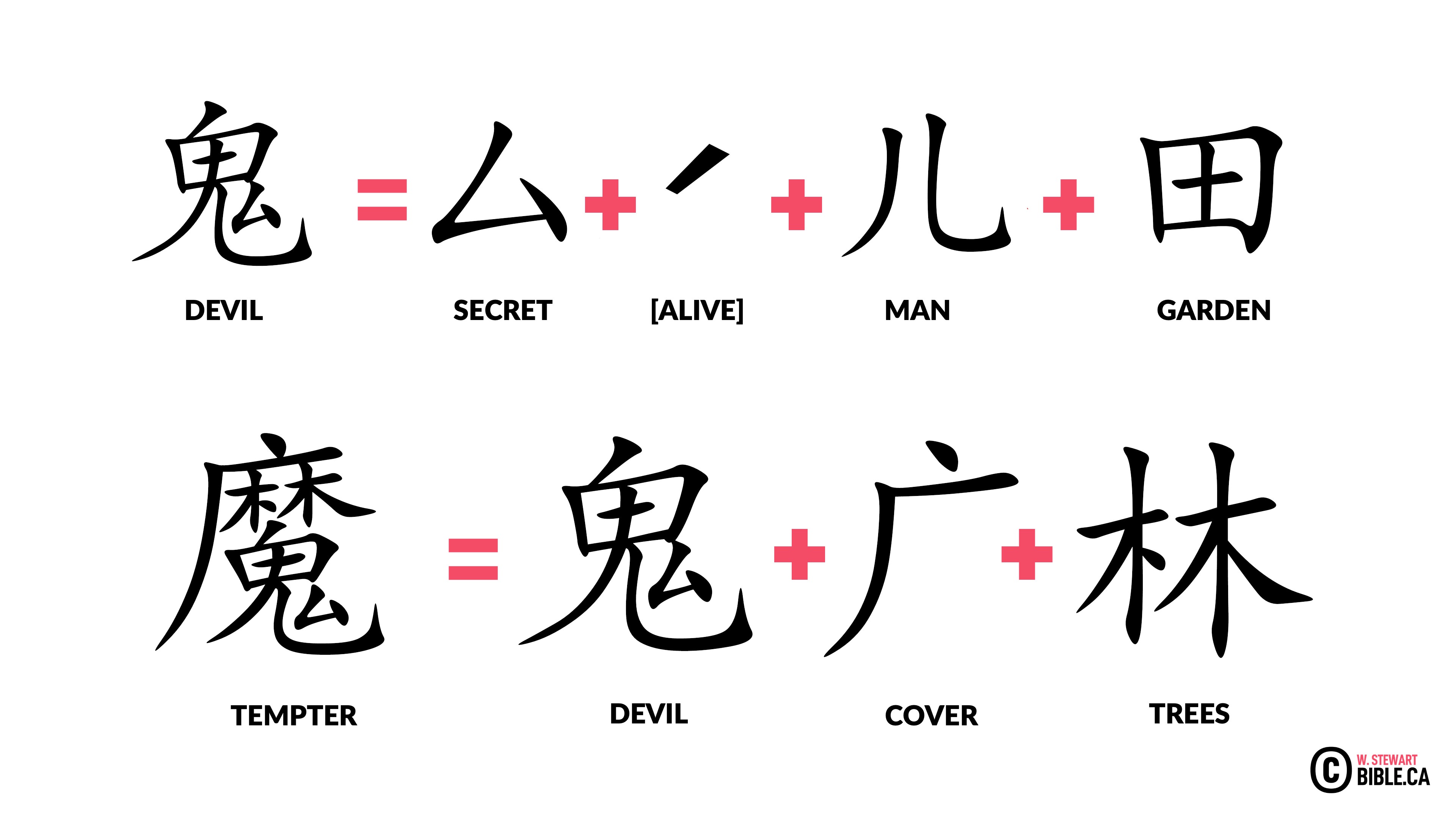
Chinese Character for Tempter
We have the character for the devil and he is very much alive and threatens our lives by what he does. But we have also this idea of tempter represented in the characters there, in addition to the devil, the trees and the covering. He is the tempter. So we have another parallel in the Chinese language that coincides with what we read in the Hebrew Bible:
When the woman saw that the tree was good for food, and that it was a delight to the eyes, and that the tree was desirable to make one wise, she took from its fruit and ate; and she gave also to her husband with her, and he ate.
- Genesis 3:6
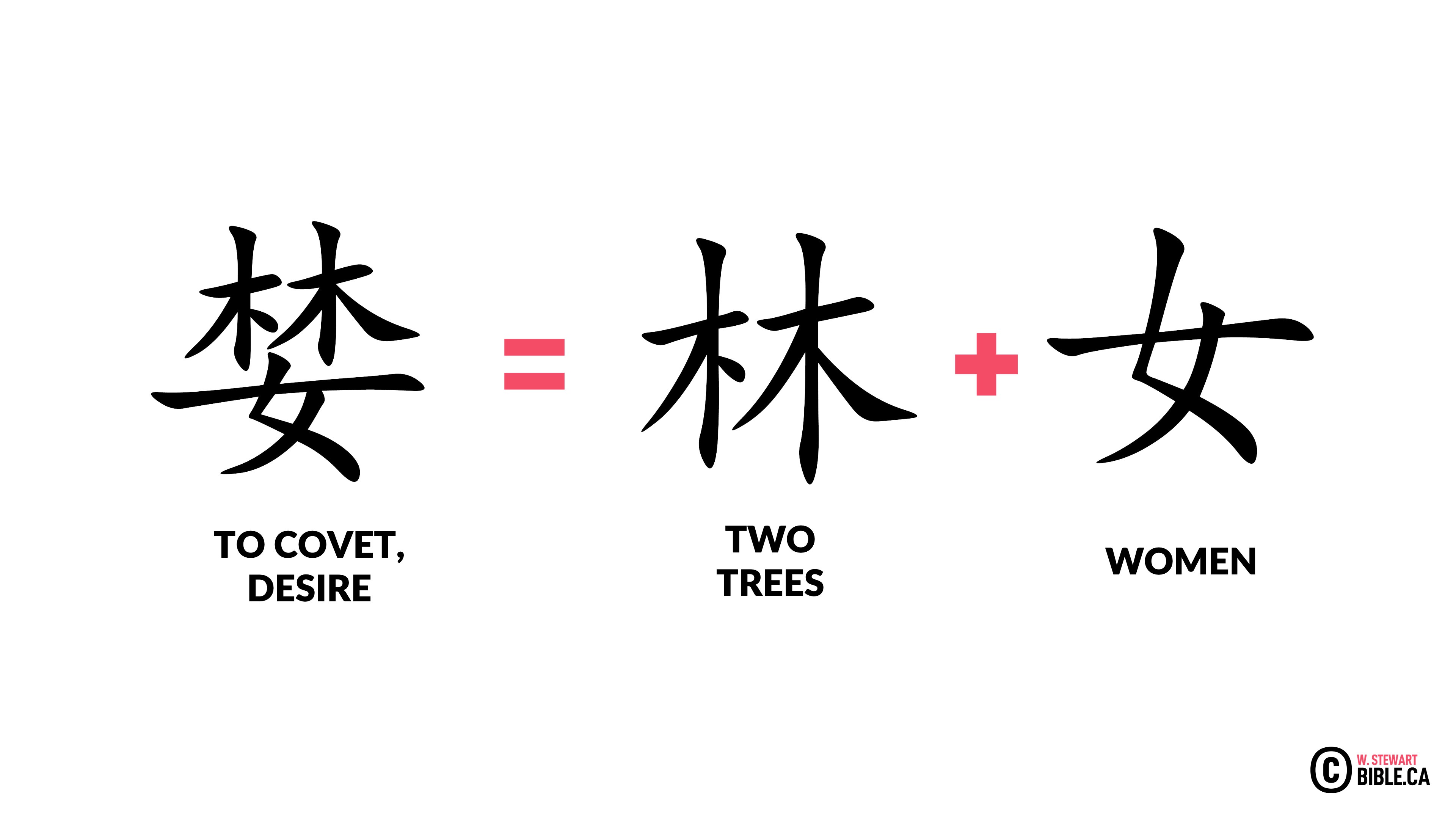
Chinese Character for Desire
The Chinese character for "to covet" or to desire is two trees with a woman. Where in the world would they get the idea for coveting being associated with two trees and a woman if not from the third chapter of Genesis?
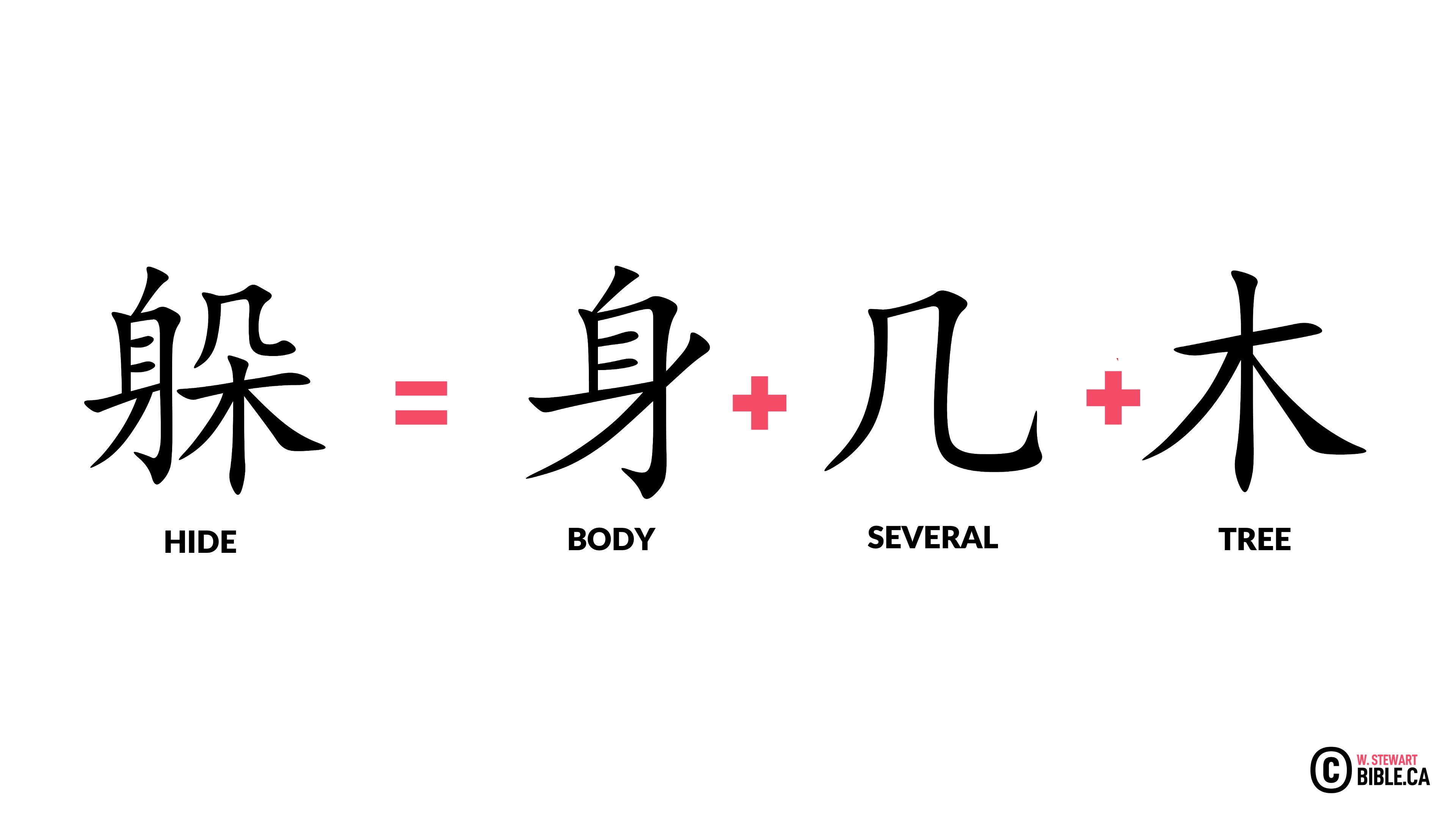
The Chinese Character for Hide
They heard the sound of the Lord God walking in the garden in the cool of the day, and the man and his wife hid themselves from the presence of the Lord God among the trees of the garden.
- Genesis 3:8
They are hiding among the trees of the garden and this Chinese character representing hide is made up of three characters, a body and then several and then trees. So here are Adam and Eve hiding their bodies among several trees. That's what Genesis 3 tells us. They heard God walking and in the cool of the garden and the cool of the day, and they were afraid because they had eaten the forbidden fruit and so they hid themselves among the many trees. That's what Genesis tells us and that's what this Chinese character represents.
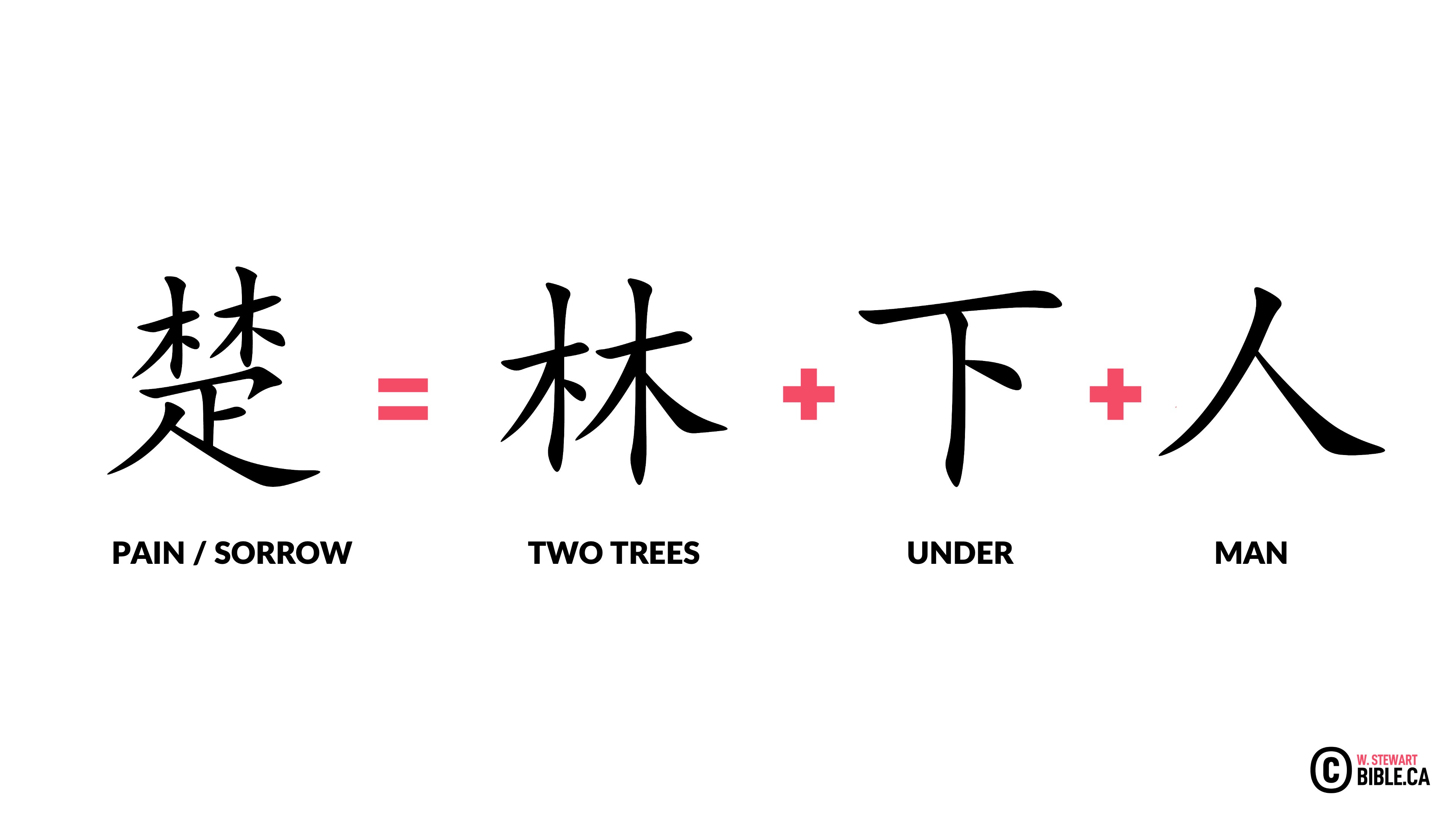
Chinese Character for Pain
To the woman He said,
"I will greatly multiply
Your pain in childbirth,
In pain you will bring forth children;
Yet your desire will be for your husband,
And he will rule over you."
- Genesis 3:16
This is the Chinese character representing pain and sorrow which is the combination of two trees, plus the symbol for under and then man. So we've got the two trees and of course Eve ate from one of those trees and then gave to her husband and he ate and part of her punishment is that she will be under her man. Her desire will be to her man. She will be subservient to him. That's the idea. That wasn't the original plan of God. But that's the way it's arranged now, because of sin coming into the world. And we see this in the Hebrew Bible, and we see it represented perfectly in this Chinese character for pain and sorrow. Two trees and the idea of subservience to man.
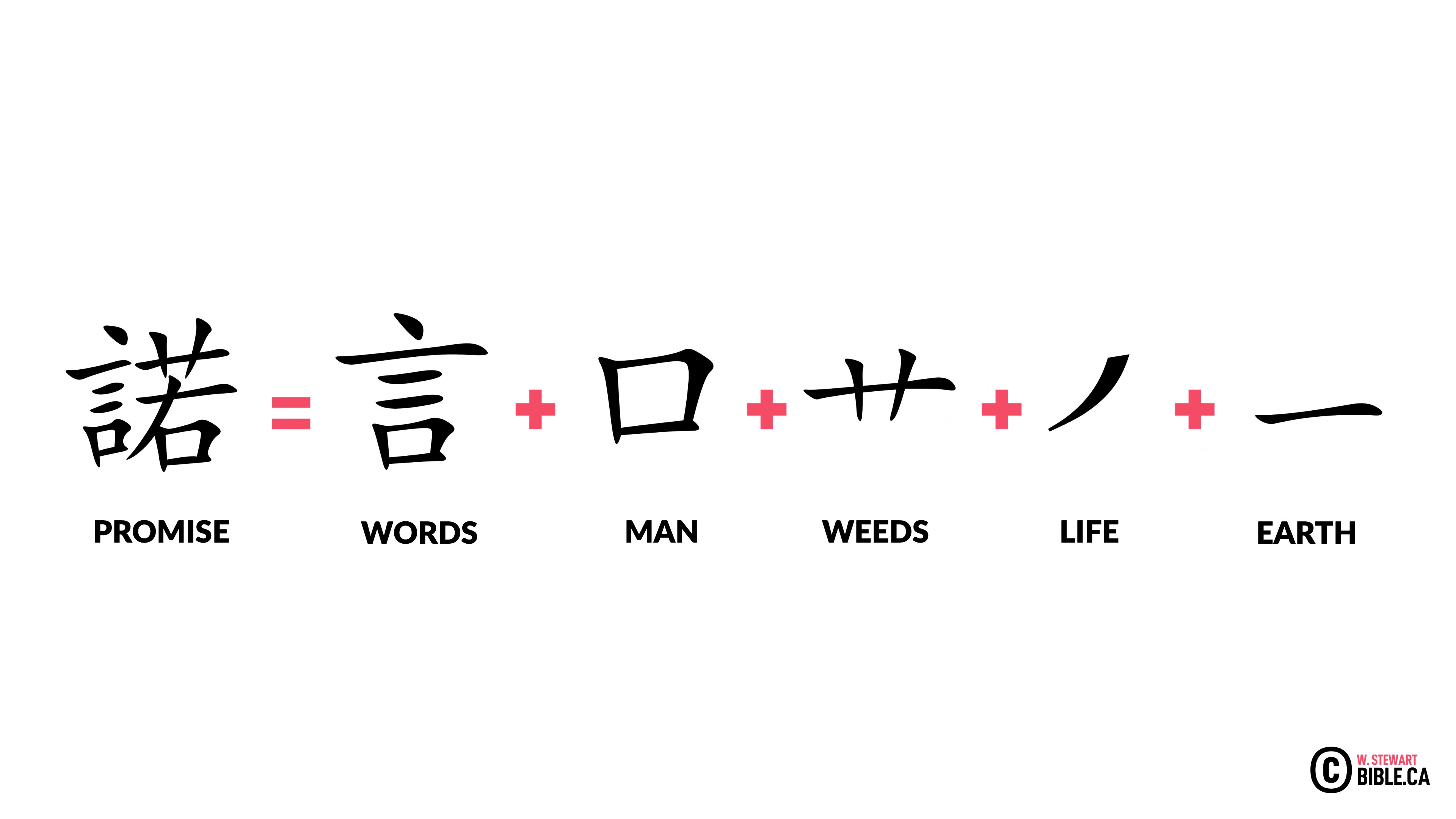
Chinese Character for Promise
17Then to Adam He said, "Because you have listened to the voice of your wife, and have eaten from the tree about which I commanded you, saying, 'You shall not eat from it'; Cursed is the ground because of you; In toil you will eat of it All the days of your life. 18"Both thorns and thistles it shall grow for you; And you will eat the plants of the field; 19By the sweat of your face You will eat bread, Till you return to the ground, Because from it you were taken; For you are dust, And to dust you shall return."
- Genesis 3:17-19
This idea of a promise, of setting something down, is seen in the Chinese character represented by the combination of words and man and weeds and life and earth. All of these elements are combined in this Chinese character, which come right off the page of Genesis 3. God spoke the words to man, his condemning words that he would have weeds to contend with and he would earn the bread of his life by the sweat of his brow, working hard to bring a living from the earth. All of that is right there in that character. And God promises Adam that this is the way it's going to be now because of what you have done, because of your sin. Very fascinating.

Chinese Character for Guard
22Then the Lord God said, "Behold, the man has become like one of Us, knowing good and evil; and now, he might stretch out his hand, and take also from the tree of life, and eat, and live forever" 23therefore the Lord God sent him out from the garden of Eden, to cultivate the ground from which he was taken. 24So He drove the man out; and at the east of the garden of Eden He stationed the cherubim and the flaming sword which turned every direction to guard the way to the tree of life.
- Genesis 3:22-24
Here is the Chinese character for guarding. It's made up of three characters. The man. And in this case, that symbol represents entrance. And then we have the symbol for tree. So the man is guarded from entering to the tree. That's exactly what we see in Genesis 3, and that's what is represented in this Chinese character. Interesting that the idea for guarding involves a tree and keeping a man away from that tree, which is what we just read.

Chinese Character for Violent / Cruel
8Cain told Abel his brother. And it came about when they were in the field, that Cain rose up against Abel his brother and killed him. 9Then the Lord said to Cain, "Where is Abel your brother?" And he said, "I do not know. Am I my brother's keeper?" 10He said, "What have you done? The voice of your brother's blood is crying to Me from the ground. 11Now you are cursed from the ground, which has opened its mouth to receive your brother's blood from your hand. 12When you cultivate the ground, it will no longer yield its strength to you; you will be a vagrant and a wanderer on the earth." 13Cain said to the Lord, "My punishment is too great to bear! 14Behold, You have driven me this day from the face of the ground; and from Your face I will be hidden, and I will be a vagrant and a wanderer on the earth, and whoever finds me will kill me." 15So the Lord said to him, "Therefore whoever kills Cain, vengeance will be taken on him sevenfold." And the Lord appointed a sign for Cain, so that no one finding him would slay him.
- Genesis 4:8-15
In the Chinese language, we have the character representing violent or cruel, which is a combination of the symbol for murder and man. A man is murdered, of course. And then we've got symbols for mouth man and seven. All of that combines to make the idea for violent or cruel. Yet another perfect parallel.

Chinese Character for Boat
13Then God said to Noah, "The end of all flesh has come before Me; for the earth is filled with violence because of them; and behold, I am about to destroy them with the earth. 14Make for yourself an ark of gopher wood; you shall make the ark with rooms, and shall cover it inside and out with pitch. 15This is how you shall make it: the length of the ark three hundred cubits, its breadth fifty cubits, and its height thirty cubits. 16You shall make a window for the ark, and finish it to a cubit from the top; and set the door of the ark in the side of it; you shall make it with lower, second, and third decks. 17Behold, I, even I am bringing the flood of water upon the earth, to destroy all flesh in which is the breath of life, from under heaven; everything that is on the earth shall perish. 18But I will establish My covenant with you; and you shall enter the ark—you and your sons and your wife, and your sons' wives with you.
- Genesis 6:13-18
I hope you find this as interesting as I do. The character for boat is a vessel with eight people in it. Why in the world would the symbol for boat wind up having eight people in it if that idea did not come from Genesis 6? The first record of a boat is God telling Noah to build an ark, he builds the ark and that ark turns out to be the salvation for himself, his wife, his three sons and their wives. Eight people saved on a boat.
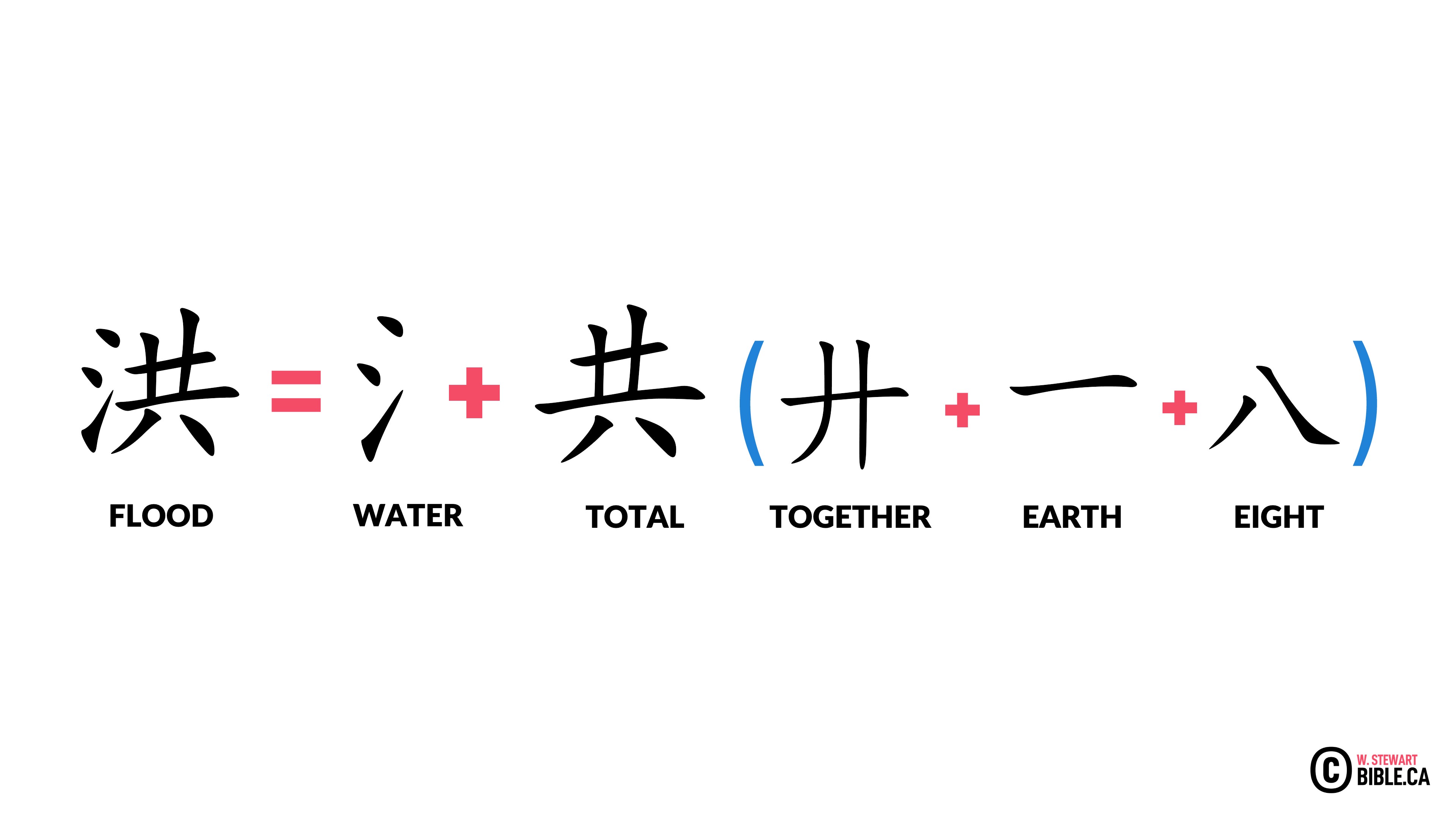
Chinese Character for Flood
17Then the flood came upon the earth for forty days, and the water increased and lifted up the ark, so that it rose above the earth. 18The water prevailed and increased greatly upon the earth, and the ark floated on the surface of the water. 19The water prevailed more and more upon the earth, so that all the high mountains everywhere under the heavens were covered. 20The water prevailed fifteen cubits higher, and the mountains were covered. 21All flesh that moved on the earth perished, birds and cattle and beasts and every swarming thing that swarms upon the earth, and all mankind; 22of all that was on the dry land, all in whose nostrils was the breath of the spirit of life, died. 23Thus He blotted out every living thing that was upon the face of the land, from man to animals to creeping things and to birds of the sky, and they were blotted out from the earth; and only Noah was left, together with those that were with him in the ark.
- Genesis 7:17-23
The Chinese symbol for flood is a combination of the symbols for water and total. The idea of totality with the symbol for together, earth and eight are all put together to refer to the idea of a flood. Isn't that fascinating that the Chinese symbol for flood incorporates all of these elements, this idea, of course, of water, but the totality? God says that the waters covered all of the earth 21 feet over the highest peak, whatever the peak was then that was the highest the water covered 21 feet above that peak. And there were eight people together above the earth in the ark. All of these elements coming together once again to parallel the story we find in Genesis 11.
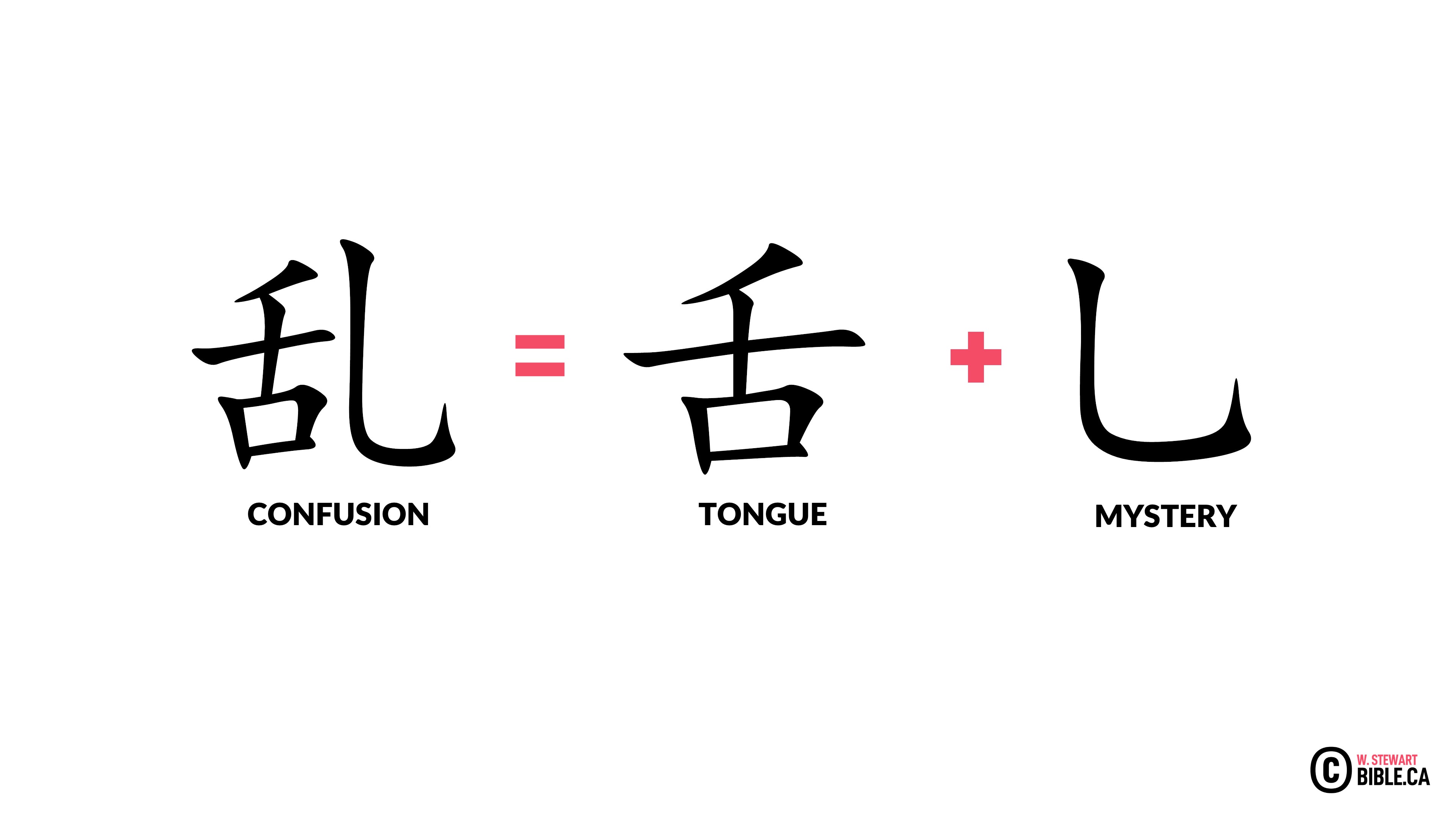
Chinese Character for Confusion
6The Lord said, "Behold, they are one people, and they all have the same language. And this is what they began to do, and now nothing which they purpose to do will be impossible for them. 7Come, let Us go down and there confuse their language, so that they will not understand one another's speech." 8So the Lord scattered them abroad from there over the face of the whole earth; and they stopped building the city. 9Therefore its name was called Babel, because there the Lord confused the language of the whole earth; and from there the Lord scattered them abroad over the face of the whole earth.
- Genesis 11:6-9
This is the Chinese symbol for confusion which is made up of two characters, one character meaning tongue, and another one for mystery. And it would be easy to conclude why they would put those characters together and talk about confusion. We've got languages and for some mysterious reason, we can't understand each other now. That's exactly what happened in Babel. God confused the languages in order to scatter the people. And so confusion is represented by tongues in a mystery. And perhaps part of the mystery is why can't I understand you?
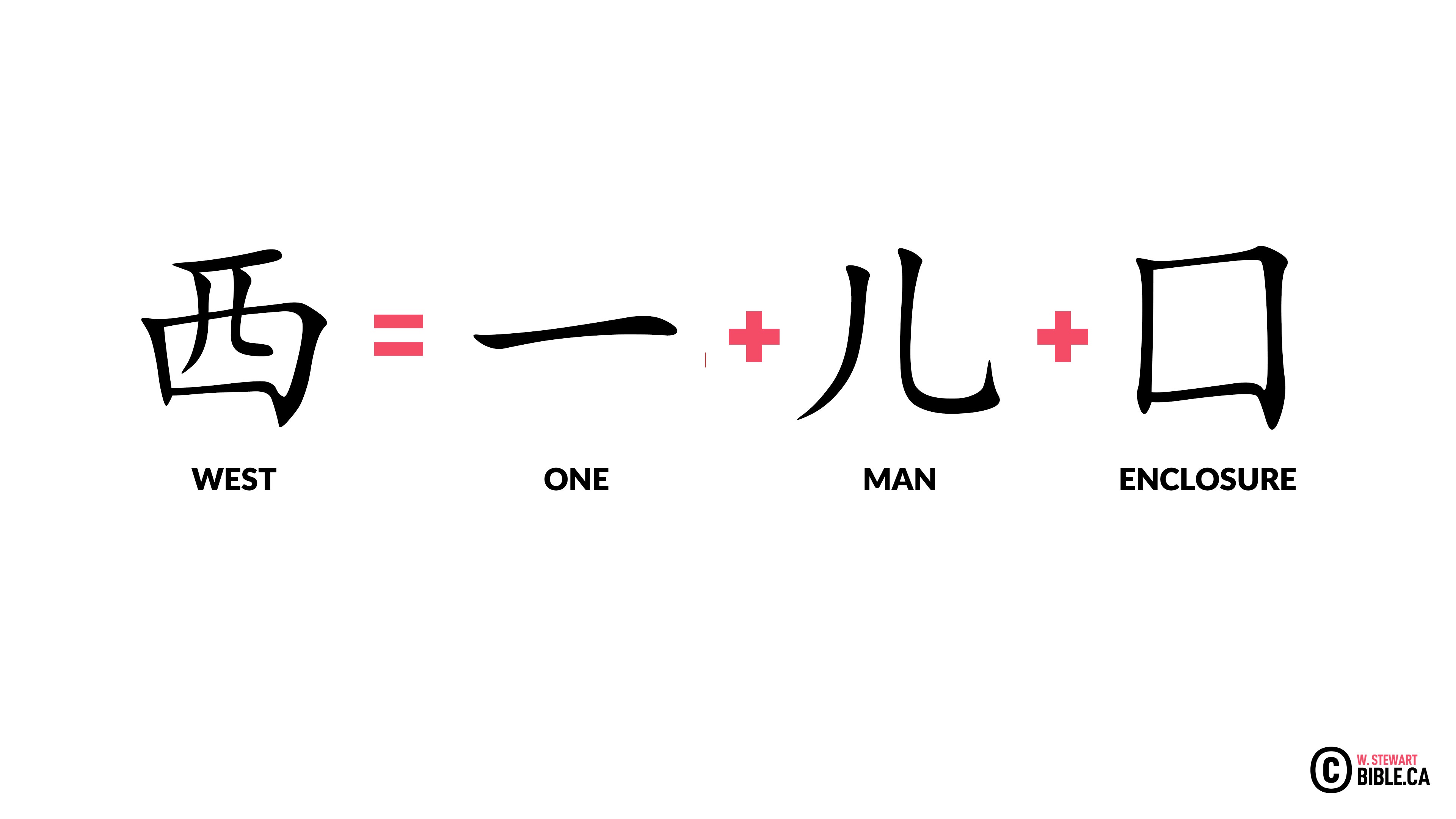
Chinese Character for West
Then we have the Chinese concept for West. And what we have for West is the symbol for one and man in an enclosure. That's what that symbol represents. One man in an enclosure. Think about that. The Chinese moved eastward from where the garden would have been and now their symbol for West is represented by where they came from. One man in a garden, where else would they get the idea for West to be one man in a garden, if not from the account given in Genesis?

Chinese Character for Righteousness
The next day he saw Jesus coming to him and said, "Behold, the Lamb of God who takes away the sin of the world!
- John 1:29
In the Old Testament we understand that sacrifices were made because of sin. And that's why Jesus came. He was the Lamb of God given to take away the sins of the world. So we've got this concept of righteousness in the Chinese represented by, first of all, the character for sheep. Sheep, an animal. That is what Abel was offering. He was offering up from his flock. That's what Jesus is called, the Lamb of God. And then we have the symbol for me or myself. And then we have interestingly enough, the Chinese symbol for hand and knife. You take a knife in your hand, you slay the sheep. And that brings righteousness to me. That's the idea. You must have a sacrifice to offer for yourself. That's what Abel was doing. And that's what God has done for us. Jesus has become our sacrifice. He's the one who has been offered up to provide for our righteousness. We have no righteousness of our own. But His righteousness is now conferred on us through faith and that's exactly what Genesis is teaching. That's what all of the Bible leads us to believe about Jesus.
What have we seen in just these 21 words?
We've seen the idea of monotheism and the practice that the Chinese originally had of worshiping only one God. We've seen the spirit nature of God, that God is a spirit. We've seen the triune nature of God, that there are three in what we would call the Godhead, the Father, Son, and the Spirit, as they're represented to us in the Bible.
We've seen man created from Dust, which is exactly what Genesis 2 tells us. We've seen the creation of woman to complete the man. We've seen the garden. We've seen the two trees that were in the garden. We've seen the Tempter or Satan. We've seen the flood with eight people saved. We've seen the confusion of languages. And that confusion taking place back to the West where the garden was. We've seen sacrificing for righteousness and we've seen more than this.
Isn't it fascinating that when we look at the Chinese language and the characters therein, we see the story of Genesis perfectly represented. What this shows us is the conclusion is ancient, but it's no secret. The worship of God, whether he is called Shang Di or something else is neither Western nor is it Middle Eastern. But this worship is universal and it is for all mankind, and it has been for all mankind from the beginning. That is what we see in this language.



